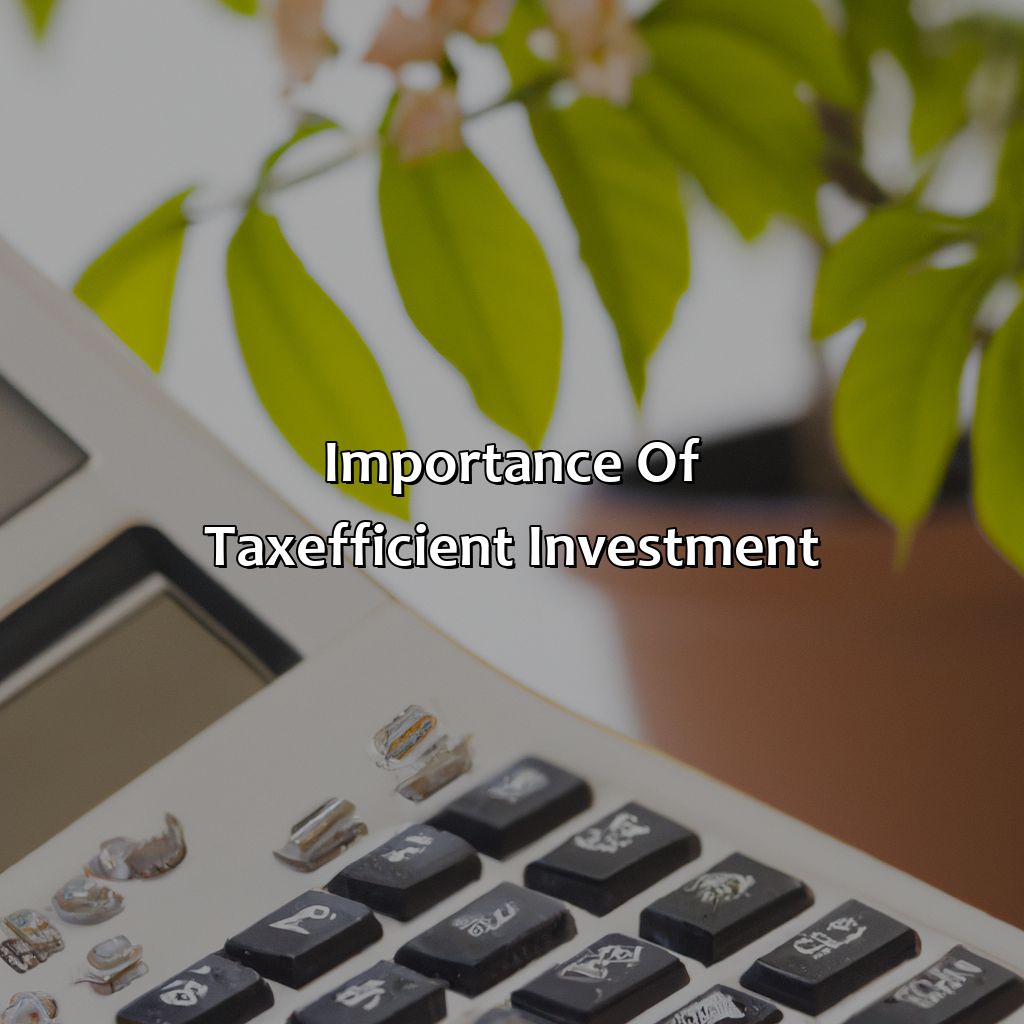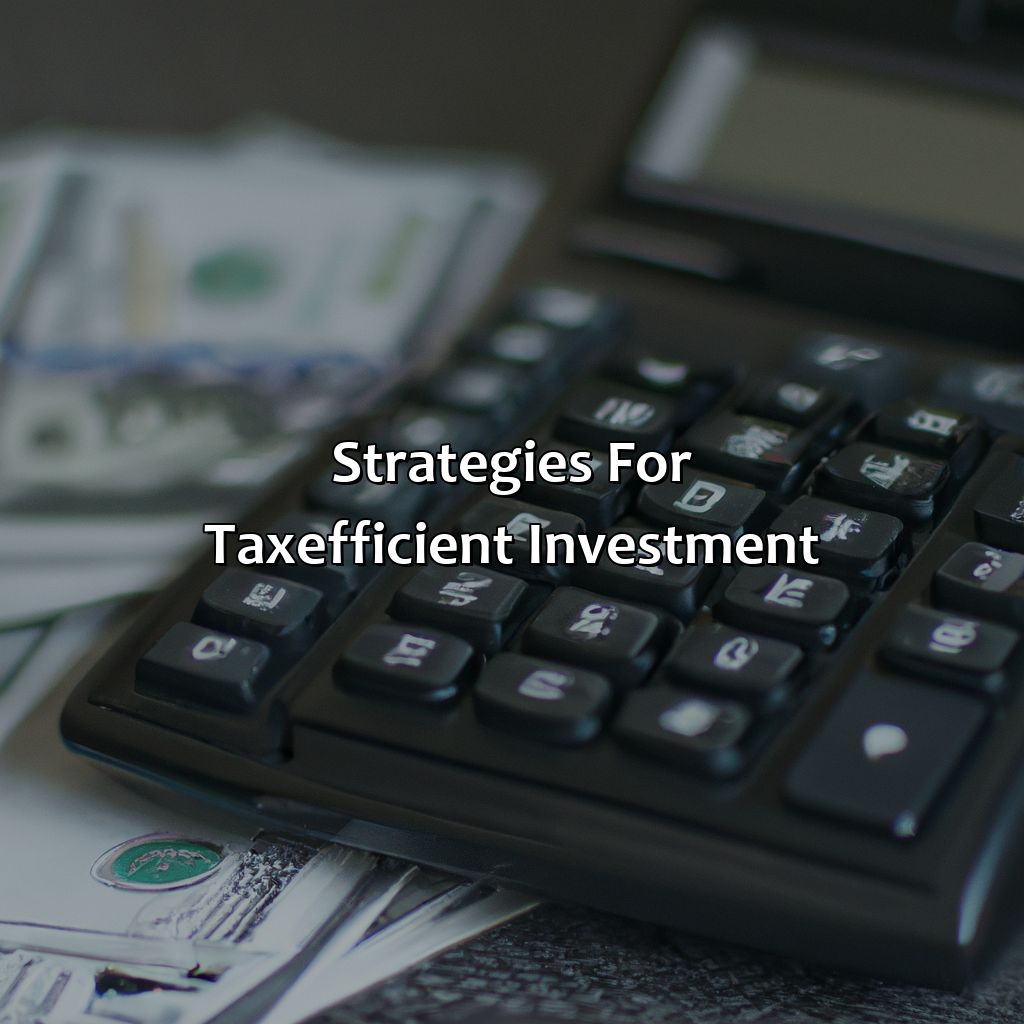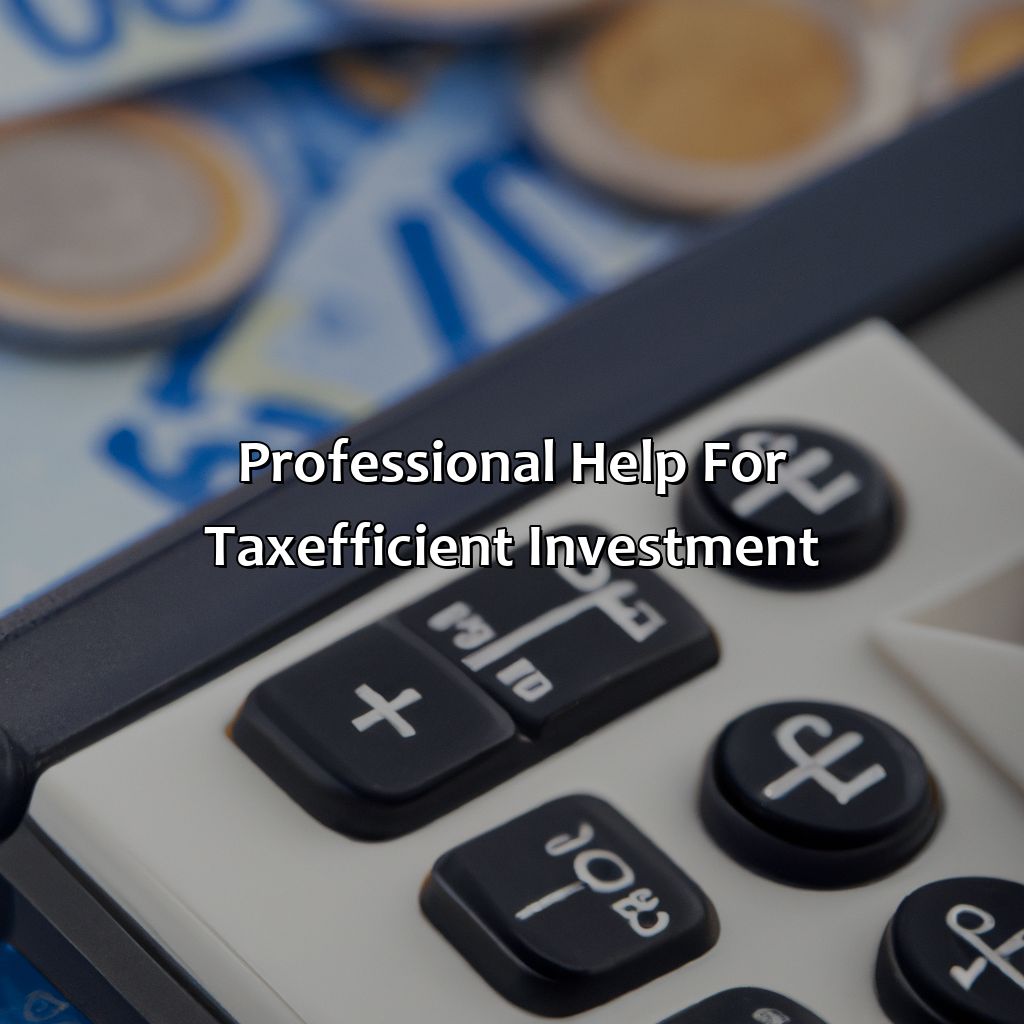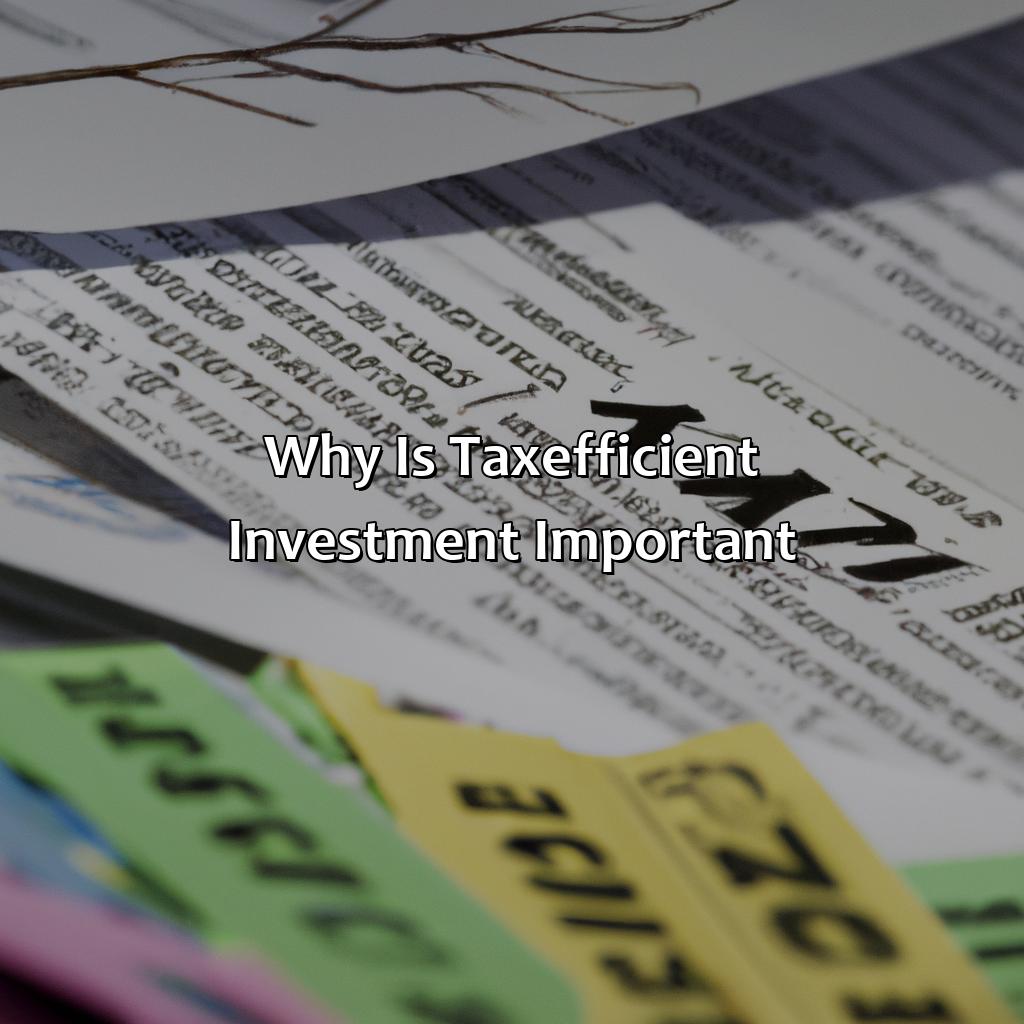Why Is Tax-Efficient Investment Important?
Key Takeaway:
- Tax-efficient investment is important for maximizing investment returns: By minimizing the amount of taxes paid on investments, investors can increase their returns and achieve their financial goals faster.
- Taxes can significantly impact investment returns: Different types of taxes on investment, such as capital gains tax and income tax, can eat into investment returns. Understanding how taxes affect investment returns is crucial for making informed investment decisions.
- Strategies for tax-efficient investment include tax-advantaged investment accounts, asset location and allocation, and tax-loss harvesting: By utilizing these strategies, investors can minimize their taxes and optimize their investment returns.
- Professional help from tax advisors, accountants, financial planners, and investment advisors can be valuable for achieving tax-efficient investment: These professionals can provide expert advice and guidance on tax-efficient investment strategies, ensuring investors make the most of their investments.
Are you looking to maximize your returns on investments while minimizing your tax burden? Tax-efficient investments are the key to achieving this! This article will explore why this type of investment is so important.
Importance of Tax-Efficient Investment
Tax efficiency is a crucial aspect to consider in investment decisions. It refers to strategies that aim to minimize the impact of taxes on investment returns. Tax-efficient investment is important as it helps investors to keep a larger portion of their returns, allowing them to achieve their financial goals sooner.
Investors can achieve tax efficiency by using various strategies such as investing in tax-efficient mutual funds, taking advantage of retirement accounts, and tax-loss harvesting. These strategies not only help investors save on taxes but also generate higher after-tax returns.
Investors should also consider the tax implications of their investment decisions. For example, they should avoid short-term trading as it incurs higher tax liabilities than long-term investments. Furthermore, they should be aware of the tax implications of interest income, dividends, and capital gains.
According to a report by Vanguard, tax-efficient investing can add up to 0.75% to an investor’s annual returns. This shows that tax efficiency is not just a nice-to-have feature but an essential aspect of investment planning. As such, investors should incorporate tax-efficient strategies into their investment plans to achieve their financial goals faster.

Image credits: retiregenz.com by James Woodhock
Taxation on Investments
Be informed about taxes and investments! To get the best returns, you must know taxation on investments. In this section, we’ll cover two subsections – How Taxes Influence Investment Returns and Different Kinds of Taxes on Investment. Maximize your returns by understanding taxes!

Image credits: retiregenz.com by Yuval Duncun
How Taxes Affect Investment Returns
Investment Returns and Taxation have a significant relationship that affects your net income. Investments can also be taxed, which is essential to understand while making investment decisions. Tax efficiency affects the amount of money the investor eventually receives from the investment. Smart investors look for tax-efficient investments that save them from heavy tax expenses on the returns.
Investors should organize their portfolio according to tax-efficient principles that maximize after-tax gains. The long-term nature of some investments makes them more suitable for lower capital gains taxes than short-term trading, leading to higher taxation and causing higher expenses in later years.
When an investor follows a strategy that combines tax optimization with prudent investment management, they are more likely to achieve their goals and build wealth over time. Insufficient knowledge about taxation leads to incorrect allocation of resources, bad timing of trades, and missed opportunities during unpredictable market situations.
According to MarketWatch, “tax-smart investing helped clients rise $12 billion last year“. Uncle Sam always finds a way to squeeze some taxes out of your investments, like a lemon in a salad.
Different Types of Taxes on Investment
Investments are subjected to various types of taxes, which can potentially decrease the overall profit earned. Understanding these taxes is crucial for a tax-efficient investment strategy.
A table to illustrate the different types of taxes on investments:
| Type of Tax | Description |
|---|---|
| Capital Gains Tax | Tax on profits made from selling an asset |
| Dividend Tax | Tax on profits earned as dividends from investments |
| Interest Income Tax | Tax on profits earned as interest income from investments |
| Estate Tax | Tax on the value of assets transferred after an individual’s death |
It is important to note that tax rates and regulations may vary across geographic locations and change over time. Therefore, investors should keep themselves updated with current policies to maximize returns.
In addition to understanding taxes, considering tax-efficient investments can also be a smart move. These are investment vehicles or strategies that minimize taxes incurred without compromising potential returns. It can lead to more significant returns over time.
For optimal investing outcomes, it is imperative to have a well-planned tax-efficient investment strategy in place. Do not miss out on maximizing your returns by overlooking this crucial aspect of investing!
Save money on taxes by investing wisely, because let’s face it, the only thing worse than paying taxes is overpaying them.
Strategies for Tax-Efficient Investment
For tax effectiveness in your investments, this section talks about different strategies. Implementing these tactics can reduce your tax bill and increase your investment earnings. We will go over tax-privileged investment accounts, asset location and division, and tax-loss gathering in more detail.

Image credits: retiregenz.com by Harry Jones
Tax-Advantaged Investment accounts
Investment strategies that provide benefits for tax-payers are referred to as ‘accounts with tax advantages’. These accounts confer financial incentives, savings in taxes and increased capital gains. The tax-advantaged accounts include traditional IRAs, Roth IRAs, Health Savings Accounts (HSAs), 529 education plans and 401(k)s. By investing through these accounts, individuals can ensure their investments have a greater chance of success while simultaneously reducing their income tax bills.
The primary advantage of these accounts is the lower tax rates on earnings. This benefit applies to all types of accounts including contributions made by both employers and employees. There are many rules on how these contributions work – some apply for the year when investment was made and others were enforced when withdrawals occur. Overall, having an understanding of which account is best suited for your financial goals will help you make informed decision about your investment portfolio.
Another important factor to consider within this context is asset diversification – it spreads out your risks across various investments rather than placing all liability into one type of investment strategy. Asset allocation reduces dependence on one economic sector while increasing overall returns.
For instance, Sarah wanted to put away $50k per annum for five years into her retirement plan; she chose a traditional IRA account as it reduces her taxable income annually by $50k. This resulted in a significant reduction in her income-tax bill—hence making it more profitable for her end-game goal.
Finding the right asset location and allocation is like finding a needle in a haystack, but with the added bonus of saving you money on taxes.
Asset Location and Allocation
Investors must consider both asset allocation and location when aiming for tax efficiency. Once the asset allocation is in place, figuring out where to hold each type of investment is crucial. Asset location involves deciding which accounts should hold specific investments to maximize tax savings. Holding highly taxed investments in tax-advantaged accounts such as 401(k)s or IRAs can generate substantial savings; this approach allows investors to keep more money working toward their investment goals.
It’s important to implement a strategy that considers the potential distributions an investment may provide. For example, if an investor needs cash flow generated by dividends and interest, they can attempt to create one or more buckets of investments providing that income stream. Investors can put those buckets in taxable accounts because they tend not to be subject to high capital gains taxes like mutual funds or other equity-related holdings.
Strategizing on how assets execute a sequence of returns, tax changes or withdrawals lets the investor capture IRS worth and reduce risks. By distributing capital across various equity types and with close attention paid to time horizon and diversification drastically reduces exposure to market volatility risk.
In practice, Nancy, a trader aimed at investing $50k in stocks decides which account should possess what type of stocks and when they ought to be liquidated based on potential market volatility using principles related to the Asset Location concept. With advice from her adviser, she locates foreign stock ETFs (low dividend yield) into Roth IRA so that taxes could cover equity fund capital gains considering historical norms dictated lower return expectation amid higher uncertainty wherein; US Treasury bonds are located within a taxable account generating income but affected lower by short term rate volatility relating them as municipals within her tax-exempt municipal bonds account provides consolidated balance without additional expense ratios mandated elsewhere.
Who knew losing could be so profitable? Tax-Loss Harvesting can help you turn investment losses into tax savings.
Tax-Loss Harvesting
Achieving tax efficiency is an integral part of modern-day investments, and there are several strategies to achieve it. One such strategy is called Harvesting Tax Losses.
It involves selling losing securities to offset profits from other investments or pay off capital gains taxes. This method can be used by investors to reduce their taxable income while keeping their investment costs low.
Tax loss harvesting is an ideal option for investors who want to save money on taxes while still maximizing returns. It allows investors to strategically manage their portfolio by embracing market volatility and regularly evaluating investments for any potential tax savings opportunities.
Investors should begin analyzing their portfolios throughout the year, ideally before the year-end approach when required transactions must take place. Tax loss harvesting applies only to taxable accounts since tax-deferred accounts are protected from capital gains taxes until they’re withdrawn.
Tax-efficient investing with disciplined focus is incredibly important in generating long-term wealth and diversifying your portfolio effectively. Be sure not to underestimate the opportunity for daily fixed-income investing strategies within this context as bond income can provide considerable tax benefits alongside asset growth opportunities.
Don’t miss out on potential returns due to a lack of awareness about how you structure your investments for maximum effect; engage in tax-efficient investing regardless of personal net worth today!
Even CPAs need a CPA when it comes to tax-efficient investment strategies.
Professional Help for Tax-Efficient Investment
For tax-efficient investing in your finances, get help from pros! Tax advisors, accountants, financial planners and investment advisors–each with their own way of getting you the most tax savings.

Image credits: retiregenz.com by Yuval Arnold
Tax Advisors and Accountants
Tax professionals play a crucial role in devising tax-efficient investment strategies for clients. They provide extensive advice on how to legally minimize tax liabilities while maximizing returns. These professionals also stay updated with all the current tax laws and regulations.
Clients rely on these experts to make informed decisions about investments, which can sometimes be complicated with different types of taxes, such as income, capital gains, or estate taxes. Tax advisors and accountants help clients determine their risk tolerance levels and come up with personalized investment plans that meet their investment objectives.
It’s important to note that not all investments are created equal regarding taxation; some are more tax-efficient than others. That’s why it’s essential to consult with a knowledgeable tax advisor or accountant before investing.
Professional help in setting up a well-planned portfolio could contribute significantly towards achieving long-term goals while reducing taxes considerably over time. Clients can save thousands by executing smart investment decisions based on expert guidance.
So if you’re looking for ways to minimize your taxes while maximizing your returns, then seeking the assistance of a knowledgeable tax professional should be at the top of your list!
Financial Planners and Investment Advisors
When it comes to managing finances and investments, seeking assistance from professionals such as Wealth Managers and Investment Consultants can be highly beneficial. These experts aid in formulating personalized investment strategies, considering market trends and an individual’s financial goals.
Furthermore, they advise on Tax-Efficient Investment – a crucial aspect of investment management that aims to minimize taxes on capital gain. This is done through diversifying assets across portfolios, making use of tax-advantaged accounts and tax-loss harvesting.
In addition, these experts regularly review and adjust investment plans relative to market conditions. Additionally, they have access to exclusive tools that enable them to oversee your portfolio’s performance comprehensively.
It is highly recommended to seek professional help for tax-efficient investment since it enables the assurance that you will get the most out of your investments while minimizing losses. Proper tax planning opens up possibilities for even more significant profits by reducing taxes on capital gains.
Five Facts About Why Tax-Efficient Investment Is Important:
- ✅ Tax-efficient investment helps to maximize after-tax returns on investments. (Source: Investopedia)
- ✅ Tax-advantaged accounts such as IRAs and 401(k)s provide benefits such as deferring taxes on contributions and earnings until withdrawal. (Source: The Balance)
- ✅ Tax-efficient investing strategies may include holding investments for more than a year to qualify for long-term capital gains rates. (Source: NerdWallet)
- ✅ Municipal bonds and tax-managed mutual funds can be used to reduce taxes on investment income. (Source: Charles Schwab)
- ✅ Good tax planning can help investors avoid making decisions based solely on tax implications and instead focus on making sound investment decisions. (Source: Forbes)
FAQs about Why Is Tax-Efficient Investment Important?
Why is tax-efficient investment important?
Tax-efficient investment is important because it helps investors to minimize the amount of taxes they pay on their investments. By using tax-efficient investment strategies, investors can potentially increase their investment earnings and grow their wealth over time.
What are some examples of tax-efficient investment strategies?
Some examples of tax-efficient investment strategies include investing in tax-advantaged accounts such as individual retirement accounts (IRAs) and 401(k) plans, diversifying investments across different types of assets and sectors, harvesting tax losses to offset gains, and using low-cost index funds and exchange-traded funds (ETFs) that have low turnover and fees.
What are the benefits of tax-efficient investment?
The benefits of tax-efficient investment include potentially higher investment returns, increased wealth over time, and greater control over investment tax liabilities. These benefits can be particularly important for investors who are in higher tax brackets or who have a significant amount of taxable assets.
Why should I consider tax-efficient investment?
You should consider tax-efficient investment if you want to potentially minimize the amount of taxes you pay on your investments, increase your investment returns, and grow your wealth over time. Tax-efficient investment can also help you to better manage investment tax liabilities and preserve more of your investment gains.
Are there any risks associated with tax-efficient investment?
There are some risks associated with tax-efficient investment, including the possibility of tax law changes that could impact investment returns, the risk of investing in specific assets that may not perform as expected, and the potential for increased complexity and administrative burden. It is important to consult with a financial advisor or tax professional to ensure that your tax-efficient investment strategy aligns with your overall investment goals and risk tolerance.
How can I learn more about tax-efficient investment?
You can learn more about tax-efficient investment by consulting with a financial advisor or tax professional who has expertise in this area. You can also do research online and read books and articles about tax-efficient investment strategies.


